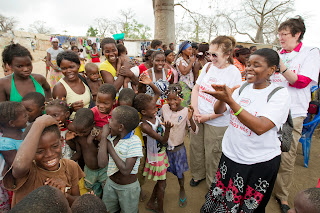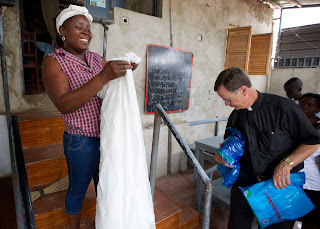NOT A SUBURB
After 24 hours of travel, your 6 Mountain Sky travelers arrived in Luanda, Angola on the evening of October 11, ate dinner, slept a good night and awoke to breakfast at 7 and departure at 7:30 am for Bom Jesus. We’d been told that Bom Jesus is a town of 10,000 outside Luanda. I was thinking suburb. But that’s not the picture. The road to Bom Jesus took us past a brand spanking new high rise apartment community outside Luanda that’s mostly vacant now. It was built by the Chinese, who are heavily invested in Angola. These might properly be called suburbs, but the apartments are too expensive for most people to afford and it is a long, slow drive to the city. So they stand vacant. A ghost city, they call it.
Bom Jesus is not a suburb. It is a region of scattered neighborhoods, loosely clustered around a few small convenience shops. It sits on a hillside overlooking the Kwanza River, source of the fertile soil deposited in periodic floods, plentiful fish, sand and limestone for a Chinese cement factory, and water for Coca Cola, a water bottling plant, and a brewery. The crumbling remains of a colonial sugar processing plant are still visible.
The River and its marshes are also the breeding ground for mosquitoes that spread Malaria, and it is the source of water born diseases. River of life. River of death.
More substantial homes in Bom Jesus are made of cement block and corrugated tin, swept neat with clean laundry hung to dry. Truly poor families live in homes made of mud or old sugar cane bags stretched on stick frames. And up above the city are a very few very wealthy homes behind security gates.
FIGHTING MALARIA: PREVENTABLE, TREATABLE AND BEATABLE!
Malaria is the first cause of death in Bom Jesus. And it is PREVENTABLE; TREATABLE; AND BEATABLE. Our mission: to help eradicate Malaria as a killer in Bom Jesus.
Before we ever arrived, Africare had trained young adults from the United Methodist Church as health workers, called Activists. They learned about Malaria: how it is carried, how it can be prevented, how its symptoms develop over time, how people can be vaccinated, or treated if they contract the disease. They learned how to register neighbors to receive anti-Malaria bed nets to protect family members from mosquitoes while they sleep. They learned how to teach people to protect themselves. On October 12 at the kick-off ceremony for the Imagine No Malaria bed net distribution in Bom Jesus, we presented certificates to the Activists who had completed their training. And we went out into neighborhoods with them to deliver bed nets to families who had registered earlier. It’s not as easy as handing someone a net. Ahead of time the Activists went door to door to record how many people live in each house; how many children and their ages; how many beds in the house. On October 11 we went back to the families that were registered and presented their bed nets, ripping open the bags they came in, taking them out and reminding the family that they need to air a day before you hang them over the bed. This is to let the pesticide that will kill mosquitoes dissipate before use. On October 12 we returned to help families hang the nets they received the day before.
Many of these families have used bed nets before and know just how to do it. But nets wear out and need to be replaced. We were pretty uncomfortable going into the bedrooms of people we had never met. Yet people were very gracious in opening their homes and working together to hang the nets.
IT’S ALL ABOUT PARTNERSHIP
Imagine No Malaria depends upon life-giving partnerships. It took four years to put the partnerships together that led to this net distribution.
UMCOR (United Methodist Committee on Relief) worked with the West Angola Annual Conference to create and train a Conference Health Board to oversee net distribution in Bom Jesus, but also to identify other urgent health needs in Angola, like hypertension, HIV/AIDS and intestinal worms.
Working together the Angolan Health Ministry and The United Methodist Church identified Bom Jesus as a town with unusually high rates of Malaria and a United Methodist Church, the perfect recipe for collaboration. And the government Health Ministry will supply the medicines to treat Malaria when it does occur.
We met three staff of Africare, the NGO (Non-governmental Organization) that procured the nets and trained the health worker Activists from Bom Jesus who register and educate families, distribute nets and monitor their proper use.
Rocky Mountain Conference funds, raised to honor Bishop Warner and Minnie Brown, paid for the nets and the cost of training and deploying the volunteer Activists. Chevron Oil has committed to tracking health statistics as the project unfolds.
IT’S ALL ABOUT CAPACITY BUILDING
Malaria is just one health challenge in a nation with many challenges and limited capacity to address them. As we tackle the immediate challenge of Malaria, the partners in this work are also focused on building the health care capacity of Angola. So, health care Activists learn about Malaria. But they can also encourage people with other ailments to seek care at the government-run clinic in Bom Jesus.
And, part of the Imagine No Malaria campaign is for the church to open a clinic to complement the work of the government clinic, which reports that it can serve only about 20% of the need at present.
And once health care Activists have experience working in neighborhoods to combat Malaria, it isn't difficult to turn their attention to other critical health issues.
OCTOBER 13.
Margaret Novak and I went with Rita, an interpreter, to one especially impoverished neighborhood near the river. When we arrived, it seemed like the whole neighborhood was gathered under a giant, noble baobab tree at the edge of town. The health care Activists were under the tree registering families to receive mosquito bed nets. They were overwhelmed with people. They struggled to write down the names of the people and their needs. The people seemed especially desperate. One woman came with a leg injury from a palm tree falling on her. Orange tips on the ends of hair of some of the children gave notice that malnutrition stalked this neighborhood. Mosquito nets couldn’t help those problems. But care and attention and prayer didn’t hurt.
AquaTap: Solar water purification
Iliff intern Brenda Harter searched the internet for articles about Malaria and Bom Jesus and the United Methodist Church in Angola before our trip. I was especially interested in an article about a demonstration solar water purification project in Bom Jesus. The system was developed by two guys in Vancouver, British Columbia. In a shipping container they build a solar powered water filtration system that provides water for 1,000 people. The Angolan government is testing it in Bom Jesus for possible use in other communities without power. The town Administrator took us to see it. The local man who maintains it opened it up and proudly showed us how it works. At the end he offered us cups to drink the clean, healthy water. What a great project!
Bishop’s Malaria Log
September 5. County Health Agent prescribes Atovaquone-Proguanil to prevent Malaria.
Begin 2 days before travel take one tablet by mouth each day during stay and for seven days after leaving area
October 9 2 pm Denver – Pill #1
October 10 Uncertain time, en route Denver to Washington D.C – Pill #2
October 11 9 pm Luanda – Pill #3
October 12 Too tired to remember Pill #4
October 13 7 am Luanda First mosquito bite on left forearm.
Pill #4
10 pm Luanda Pill #5
October 14 10 pm Luanda Pill #6
Second mosquito bite on left forearm and right ear
October 15 7 am Luanda Mosquito bite on right forearm
Notes from Robin Ball
Hope – a necessity for mankind. Is there hope for Angola? After decades of colonialism, decades of war, exploitation of resources, emigration of intellectuals?
The young adults I have spoken to and watched these past 3 days believe there is. George came back from Africa University in Zimbabwe to lead his local church into the community to make disciples of Jesus Christ. His degree is in theology with a minor in humanities. He wants to get his master’s in the Peace and International government program. He believes the church should be a leader in promoting peace and service.
Addison is a young pastor appointed to a small rural congregation. He believes that working together can build a good place for all.
And the many “activists” or volunteers that are becoming community health workers to save lives through education, mosquito net distribution and follow up training.
Notes from Mike Dent
I’m thankful to be part of this unique visit to experience first hand to experience the church’s good work in global health care and look forward to sharing photos, stories and experiences when I get back.
Notes from Margaret Novak
Aside from the mission we engaged in, I was impressed with the water program we visited, where a shipping container was converted into a water purification system designed by a team in Vancouver, B.C.
I’ve learned how important it is for the church to work in partnerships in order to do the most good. The partnerships are strong with Africare’s holistic work in global health was exciting. This is a non-church, non-governmental organization doing excellent work and also with the local municipal administration in Bom Jesus.
Striking to see the disconnect between the affluent congregations of Luanda and the needs of the very poor in surrounding areas. Just like home.







I am interested in the solar water purification process. Can someone please contacts me at 256-642-1759 in the USA. Thanks, Ray Crump
ReplyDeleteso does anyone know a good company for getting the iron work gates? like the security gates vancouver? i want one of those
ReplyDelete